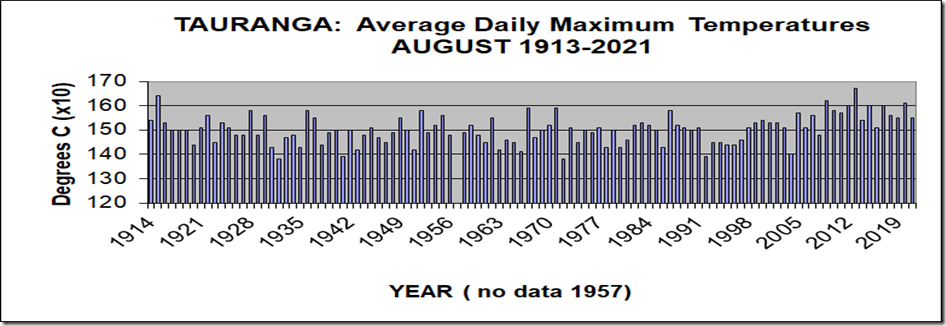Table of Contents
John Maunder
Rainfalls for the month of August have been recorded in Tauranga since 1898, except for 1904, 1907, 1908 and 1909.
From January 1898 to December 1904, the observation site was described as the Tauranga Harbour, from November 1904 to April 1907 the site was described as simply ‘Tauranga’. From January 1910 to December 1923 the site was Waikareao, in Otumoetai; from January 1924 to September 1940 the site was at 148 Waihi Rd, in Judea; from October 1940 to January 1941 the site was at Te Puna; and from February 1941 to now, the site is Tauranga Airport. The methodology use in adjusting the older sites to the current observing site is published in the ‘NZ Meteorological Service Miscellaneous Publication’ No 180 in 1984.
It is considered that the homogeneous rainfall and temperature series described here is a fair and true record of what the rainfall and temperatures would have been if the current observation site (Tauranga Airport) had been used since 1898 and 1913. This should be coupled with the understanding that although standard accepted methodologies have been used, any adjustments are only estimates of what would have occurred if the location of the rainfall and temperature records had always been in the same place with the same surroundings and the same or similar recording gauges.
In terms of climate change (such as is it getting wetter or drier, or warmer or colder), the methodology used in computing an ‘official’ set of climate observations is very important, as otherwise erroneous conclusions may be drawn.

The graph shows the range of rainfalls from an extreme high of 274 mm in 2010 to a low of only 17 mm in 1914.
The second wettest August was 1916 when 263 mm was recorded, and the second driest August was in 1982 when only 31 mm fell.The long-term average rainfall for Tauranga for August is 124 mm. The rainfall for Tauranga for August 2021 was 42 mm the fourth driest on record. The graph of the August rainfall shows normal variations from year-to-year.
There is a small decrease in the overall August rainfalls during the last 50 years – from 1961-2010 – from an average of 121 mm, compared with an average of 133 mm during the 50 years from 1911-1960. Since 1898, there have been 11 August months with a rainfall of 220 mm or more – with 10 occurring during 1900 to 1976 – and only one August month since then 2010, which was the highest rainfall for any August. Only six August months have had rainfalls of 50 mm or less.
Chronologically, the 11 wettest August months are 1913, 1916, 1920, 1927, 1938, 1942, 1957, 1965, 1970, 1976 and 2010.
In contrast, chronologically the sixth driest August months are 1914, 1921, 1982, 1983, 2002 and 2021.
Tauranga August Average Afternoon Temperatures 1913-2021
Temperatures have been recorded in the Tauranga area at several sites in the last 100 years, including the current Tauranga Airport site from June 1990.
The graph shows details of the average daily maximum temperatures, called simply ‘afternoon’ for Tauranga for August from 1913-2021. The average for August 2021 was 15.5 degrees Celsius.
The long-term average afternoon temperature in August for Tauranga is 14.8 degrees Celsius. The coolest August months have been 1932 with 13.8 degrees Celsius, and 1941 and 1992 recording 13.9 degrees Celsius.
The warm August months have been 2013 with 16.7 degrees Celsius, and 1915 with 16.4 degrees Celsius, while 2009 had 16.2 degrees Celsius.
The graph of the average afternoon temperatures for August shows generally normal variations from August to August during the last 108 years.

But several recent August months have been a little warmer than others since 1913. This includes August 2013, the warmest on record with a temperature of 16.7 degrees Celsius, which was 1.9 degrees Celsius above average.
From 1913 to 2021, there have been 11 August months with an average afternoon temperature of 15.8 degrees Celsius or more.
Thirteen August months have had an average afternoon temperature of less than 14.3 degrees Celsius.
The sixth warmest August months – in terms of afternoon temperatures – on record in chronological order are: 1915, 1967, 1971, 2009, 2012 and 2013. By contrast, the fifth coolest August months – in terms of afternoon temperatures – on record, in chronological order are: 1932, 1941, 1966, 1992 and 2004.
The average afternoon temperatures during August for the period 1914-1963 were 14.7 degrees Celsius, compared with 15.0 degrees Celsius from 1964 to 2013.
For further Infomation about a wide range of weather/climate matters see my new book Fifteen shades of climate… the fall of the weather dice and the butterfly effect.
BUY Your Own Copy of Dr John Maunders book Fifteen Shades of Climate Today.

Please share so others can discover The BFD.









